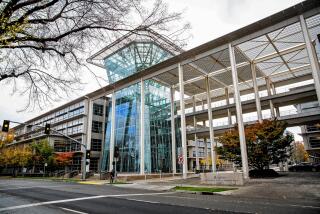Entrepreneur’s Russia Venture Just Doesn’t Fly : Investing: Steve Myers of Newport Beach cuts his losses in aircraft refueling operation at air base. Rising demand can’t save California Kamchatka Co.
- Share via
NEWPORT BEACH — Suffering losses and unable to raise capital for needed equipment at an airport on Russia’s Pacific Coast, a Newport Beach entrepreneur said Tuesday that he is withdrawing from a joint venture there to service freight planes.
Steve Myers said that he is folding the organization he founded, California Kamchatka Co., which had joined with a Russian company in 1992 to operate an aircraft refueling station at a military base just outside Kamchatka’s capital, PetropavlovskKamchatskiy.
The operation had handled 160 planes since it began in December, 1993, Myers said, but wasn’t profitable. He declined to specify the company’s losses or its revenues.
Despite increasing demand from airfreight companies that use the airport as a stopover on flights between North America and the Far East, Myers said he couldn’t find investors willing to back the operation or to buy it for an asking price of about $10 million.
“I’m not bitter on the experience, I don’t regret that I did it,” he said. “In the end, it’s all about making money. I just couldn’t see any way to make the thing run in the black.”
With Myers’ withdrawal from Kamchatka, Larry Lane, president of Evergreen International Airlines Inc. in McMinnville, Ore., said his company has begun diverting its four weekly Boeing 747 flights to and from China to airports in Japan and in the Russian city of Khabarovsk. A larger American company, Dyncorp, based in Reston, Va., also runs a refueling joint venture at the Russian city.
Petropavlovsk-Kamchatskiy was a good location for California Kamchatka’s venture, Lane said, but harsh winter conditions made it crucial for Myers to obtain de-icing machines, devices to restart jet engines and other equipment to service planes there.
“It’s hard to put these things together,” Lane said.
“When you’re used to dealing with the U.S. type of air operations and you start dealing with the Russians, it’s imperative you have people in place, but even that doesn’t mean it will succeed,” he said.
Myers criticized the slow pace at which U.S. government agencies have reviewed proposals for investment assistance, and the demands of U.S. banks for what he called excessive collateral guarantees, both of which he said made it difficult to improve California Kamchatka’s facilities.
Steven E. Halliwell, chief financial officer of the Russian-American Enterprise Fund in New York City, a quasi-governmental agency that was considering an investment application from California Kamchatka, said it was “unfortunate” that its Moscow-based research teams were not able to complete a review of the company’s proposal sooner.
The fund, to which Congress has allocated nearly $340 million to distribute over three years, has received more than 2,000 proposals and doesn’t have the staff to review them faster, Halliwell said.
While smaller proposals like California Kamchatka’s are promising, many of Russia’s aviation-related investments will require much more support than the $10-million ceiling that the fund tries to put on its investments, Halliwell said.
Myers said dealings with his Russian partners were at times difficult, but such concerns were less of a factor in persuading him to leave than were his capital-formation problems.
“In the United States we have a concept here that everything that’s not expressly prohibited is OK. Over there, it’s everything that’s not expressly permitted is prohibited,” he said.
“What you’re fighting with is an utter and complete lack of economic principles, combined with a fear on their part that they’ll get taken advantage of.”
Myers said he will now concentrate on his Newport Beach-based aerospace and environmental management consulting company, which he expects will grow from about $15 million in revenues in 1994 to $18 million next year. He said the consulting company had $9 million in revenue in 1992, and grew despite his involvement in the airfreight operations.
The joint venture’s seven American employees will be transferred to the consulting group or given severance packages, Myers said, adding that the fate of the 17 Russian employees based at the airport will be up to their employer, known by its acronym AKCORD.
More to Read
Inside the business of entertainment
The Wide Shot brings you news, analysis and insights on everything from streaming wars to production — and what it all means for the future.
You may occasionally receive promotional content from the Los Angeles Times.








